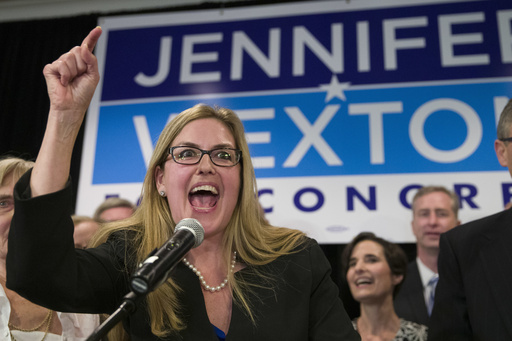**Women in Politics: Reflection on Their Journey and the Path Ahead**
In Washington, Democratic Representatives Abigail Spanberger and Jennifer Wexton burst onto the political scene six years ago, part of a record-setting wave of women candidates aiming for House seats, primarily to counter Donald Trump’s political influence. “We were part of that 2018 class, and we sort of ran in there like: ‘There’s a fire. We’re here,’” Spanberger shared in a recent interview, highlighting the urgency and passion they felt upon entering office. However, the political environment has markedly shifted since their arrival. Trump, whom both lawmakers campaigned against, is now poised for a potential second term after an unlikely comeback, and from the original group of 35 female Democrats elected in 2018, Spanberger and Wexton will be among 14 who have left or will be stepping down from Congress.
Despite leaving their congressional posts, both Spanberger and Wexton emphasize that their commitment to public service isn’t over. According to Kelly Dittmar from the Center for American Women and Politics, Virginia has often served as a bellwether for female political engagement, evidenced by the increase in female representatives following the 2017 elections in the state. Yet, as Dittmar points out, progress towards gender parity in politics has not always been a straightforward path. Last month, out of the original group of female Democrats, 21 sought reelection, and 20 were successful, ensuring continued female representation in the upcoming Congress, although Virginia’s representation will diminish from four women to two as Spanberger and Wexton exit.
The 2023 elections highlighted a significant moment for Virginia as Spanberger campaigns to become governor alongside fellow candidate Jennifer McClellan, making it likely that the state will see its first female governor. However, experts like Dittmar note the heightened impact of losing women from political office, especially in areas already lacking representation. The future remains uncertain regarding whether the U.S. will experience another wave of women candidates motivated by prevailing political tensions and the “toxicity” of modern campaigning. She emphasizes the fatigue and challenging dynamics potential candidates may weigh when considering a run for office.
The paths for both Spanberger and Wexton were not without unexpected challenges. Following two successful reelection campaigns, Wexton confronted a diagnosis of progressive supranuclear palsy, a debilitating neurological condition resembling Parkinson’s disease, leading her to retire. In contrast, Spanberger is pivoting her focus toward gubernatorial aspirations. Their departure underscores a significant reduction in female congressional representation from Virginia, transitioning from four women down to two.
Reflecting on their time in Congress, Spanberger and Wexton shared their experiences and the lasting bond they formed during their tenure. Their friendship was cultivated in the tumultuous world of politics, anchored by shared values and a commitment to their constituents. They fondly recalled the grassroots support that propelled them into office, fueled by women who mobilized to challenge the status quo in light of Trump’s rise.
Wexton, who previously served as a state senator and prosecutor, garnered respect for her advocacy in her district, consistently seeking funding and championing significant legislation. Her concerns included addressing opioid addiction and advocating for transgender rights, and after her diagnosis, she co-sponsored the National Plan to End Parkinson’s Act, which President Biden signed into law, earning the notable recognition of having the legislation named in her honor. Spanberger, a former CIA operative, focused on less publicized but equally important issues such as expanding broadband access in rural areas and addressing drug trafficking. Her efforts earned her recognition as one of the most bipartisan members in the House last year.
Their bond deepened during their campaigns, evolving into a sisterly relationship where they supported each other’s endeavors. Wexton once described Spanberger as her quick-witted older sister, fully engaged in the nuances of political life. Wexton’s struggles with her health were met with kindness and humor from Spanberger, going so far as to assist her with hairstyling before public events. Wexton soon began to confront the harsh reality of her disease, which has impacted her ability to speak and walk, yet she remains determined to assert her identity and contributions.
As they approach the end of their congressional terms, both women reflect on Trump’s return to the forefront of politics and its implications for the future of female representation in government. Spanberger conveyed a bittersweet feeling about the shift in their trio of women in Congress, stating support for their successors, whereas Wexton expressed hope for continued engagement and activism among women. “We’re not going to win every battle or every election,” she stated, “but it is true that our democracy works best when more people participate in it.” Their reflections capture not only the challenges of their journey but also the resilience they hope to inspire in the fight for equity in political representation.


